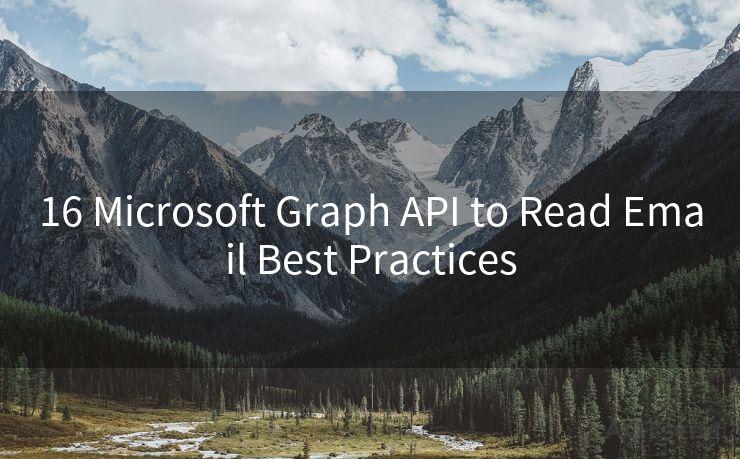16 Microsoft Graph API to Read Email Best Practices




Introduction
The Microsoft Graph API provides a unified programmability model that can be used to access data in Office 365, Windows 10, and Enterprise Mobility + Security. Among its various functionalities, the ability to read emails stands out as a powerful tool for developers. However, to make the most of this feature, it's essential to follow best practices. In this article, we'll explore the top 16 best practices for using the Microsoft Graph API to read emails.
1. Understand the API Basics
Before diving into the specifics of reading emails, it's crucial to have a solid understanding of the Microsoft Graph API's fundamentals. Familiarize yourself with its endpoints, authentication methods, and data models.
2. Secure Authentication
Ensure that your application uses secure authentication methods, such as OAuth 2.0, to access the Graph API. This ensures that only authorized users can access their emails.
3. Manage Permissions Properly
When requesting access to a user's emails, only ask for the necessary permissions. Avoid requesting unnecessary scopes, as this can raise privacy concerns.
4. Handle Errors Gracefully

The API may return errors due to various reasons, such as invalid requests or server issues. Implement robust error handling mechanisms to manage these situations effectively.
5. Optimize Data Retrieval
To minimize latency and improve performance, use the API's filtering, sorting, and pagination features to retrieve only the data you need.
6. Respect Rate Limits
The Microsoft Graph API has rate limits to prevent excessive usage. Monitor your application's API calls and implement retry logic to handle rate limit exceptions gracefully.
7. Maintain Data Privacy
When handling sensitive email data, ensure compliance with data protection regulations like GDPR. Encrypt data in transit and at rest, and only store what's necessary.
8. Use Delta Queries for Changes
To efficiently track changes in email data, utilize delta queries. This feature allows you to retrieve only the changes since your last query, reducing bandwidth usage and processing time.
9. Leverage Batching for Multiple Requests
If your application needs to make multiple API requests simultaneously, consider using batching. This technique combines multiple requests into a single HTTP call, improving efficiency.
10. Monitor and Log API Usage
Regularly monitor your application's API usage to identify patterns, troubleshoot issues, and optimize performance. Keep detailed logs for auditing and compliance purposes.
11. Stay Up to Date with API Changes
The Microsoft Graph API evolves continuously. Stay informed about new features, improvements, and deprecations by subscribing to official channels and participating in the developer community.
12. Implement Caching Strategies
To further enhance performance, consider implementing caching strategies for frequently accessed email data. This can significantly reduce the number of API calls needed.
13. Test in Different Environments
Ensure your application works reliably in various environments by testing it against different Office 365 tenants and configurations.
14. Follow Security Best Practices
Protect your application and user data by following security best practices, such as using HTTPS, validating input, and sanitizing output.
🔔🔔🔔
【AOTsend Email API】:AOTsend is a Managed Email Service for sending transactional emails. Support Email Types: reminders, authentication, confirmations, notifications, verification codes, invoices, password resets, account activations, billing statements, two-factor authentication (2FA), and one-time passwords (OTP) emails, etc. $0.28 per 1000 Emails. 99% Delivery, 98% Inbox Rate.
You might be interested in:
Why did we start the AOTsend project, Brand Story?
What is a Managed Email API, How it Works?
Best 25+ Email Marketing Platforms (Authority,Keywords&Traffic Comparison)
Best 24+ Email Marketing Service (Price, Pros&Cons Comparison)
Email APIs vs SMTP: How they Works, Any Difference?
15. Provide Clear User Consent
When requesting access to a user's emails, ensure you provide clear and transparent information about why you need the data and how it will be used.
16. Seek Expert Advice
If you encounter complex issues or need guidance on best practices, don't hesitate to seek help from the Microsoft Graph API community or expert developers.
Conclusion
By following these best practices, you can ensure that your application effectively and securely utilizes the Microsoft Graph API to read emails. Remember, the key to success lies in staying up to date with the API's evolution and continuously optimizing your implementation based on user feedback and performance metrics.




Scan the QR code to access on your mobile device.
Copyright notice: This article is published by AotSend. Reproduction requires attribution.
Article Link:https://www.mailwot.com/p2221.html



